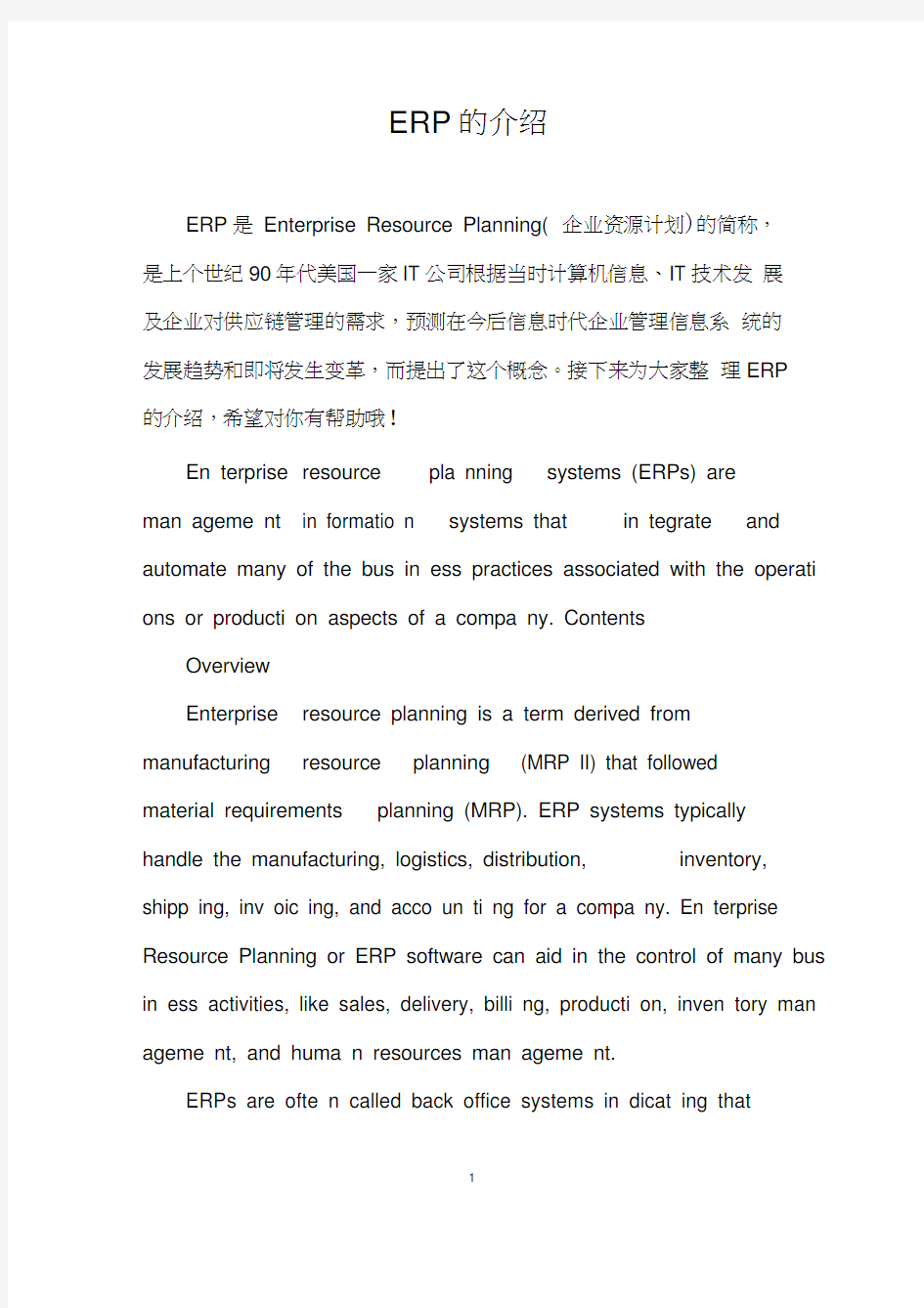ERP的介绍

- 1、下载文档前请自行甄别文档内容的完整性,平台不提供额外的编辑、内容补充、找答案等附加服务。
- 2、"仅部分预览"的文档,不可在线预览部分如存在完整性等问题,可反馈申请退款(可完整预览的文档不适用该条件!)。
- 3、如文档侵犯您的权益,请联系客服反馈,我们会尽快为您处理(人工客服工作时间:9:00-18:30)。
ERP的介绍
ERP 是Enterprise Resource Planning( 企业资源计划)的简称,是上个世纪90年代美国一家IT公司根据当时计算机信息、IT技术发展及企业对供应链管理的需求,预测在今后信息时代企业管理信息系统的发展趋势和即将发生变革,而提出了这个概念。接下来为大家整理ERP 的介绍,希望对你有帮助哦!
En terprise resource pla nning systems (ERPs) are
man ageme nt in formatio n systems that in tegrate and automate many of the bus in ess practices associated with the operati ons or producti on aspects of a compa ny. Contents
Overview
Enterprise resource planning is a term derived from manufacturing resource planning (MRP II) that followed material requirements planning (MRP). ERP systems typically handle the manufacturing, logistics, distribution, inventory, shipp ing, inv oic ing, and acco un ti ng for a compa ny. En terprise Resource Planning or ERP software can aid in the control of many bus in ess activities, like sales, delivery, billi ng, producti on, inven tory man ageme nt, and huma n resources man ageme nt.
ERPs are ofte n called back office systems in dicat ing that
customers and the general public are not directly invoIved. This is contrasted with front office systems like customer relationship
management (CRM) systems that deal directly
with the customers, or the eBus in ess systems such as eCommerce, eGoverme nt, eTelecom, and eFinan ce, or supplier
relatio nship management (SRM) systems that deal with the suppliers.
ERPs are cross-fu ncti onal and en terprise wide. All fun cti onal departme nts that are invoIved in operations or producti on are integrated in one system. In addition to manu facturi ng, warehous ing, logistics, and In formatio n Tech no logy, this would in clude acco unting, huma n resources, marketi ng, and strategic man ageme nt.
In the early days of bus in ess computi ng, compa nies used to write their own software to con trol their bus in ess processes. This is an expe nsive approach. Since many of these processes occur in com mon across various types of bus in esses, com mon reusable software may provide cost-effective alter natives to custom software. Thus some ERP software caters to a wide range of in dustries from service sectors like software ven dors and hospitals to manu facturi ng in dustries and eve n to gover nment departme nts.
Impleme ntatio n
Because of their wide scope of applicati on with in the firm,
ERP software systems rely on some of the largest bodies of software ever writte n. I mpleme nting such a complex and huge software system in a company usually invoIves an army of an alysts, programmers, and users, and often comprises a very expensive project in itself for bigger companies, especially transn atio nals.
Enterprise resource planning systems are often closely
tied to supply chain management and logistics automation systems. Supply cha in man ageme nt software can exte nd the ERP system to in clude links with suppliers.
To impleme nt ERP systems, compa nies ofte n seek the help of an ERP ven dor or of third-party con sult ing compa ni es. Con sult ing in ERP invo Ives two levels, n amely bus in ess con sult ing and tech ni cal con sult ing. A bus in ess con sulta nt studies an orga ni zati on& #39;s curre nt bus in ess processes and matches them to the corresponding processes in the ERP system, thus 'configuring' t he ERP system to the
orga ni sati on& #39;s n eeds. Tech nical con sult ing ofte n invo Ives program ming. Most ERP ven dors allow cha nging their software to suit the bus in ess n eeds of their customer. But
customiz ing an ERP package is very expe nsive and complicated, so most bus in esses impleme nt the best practices
